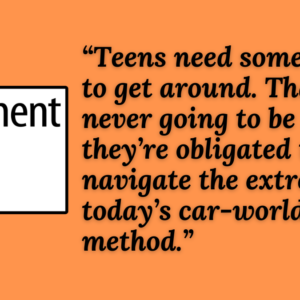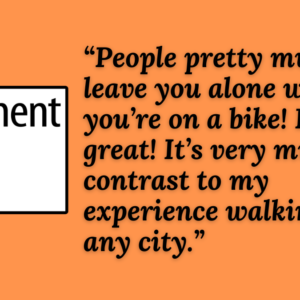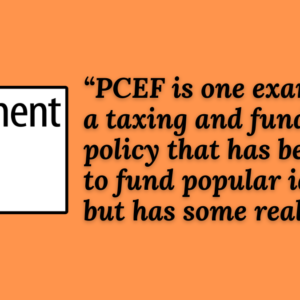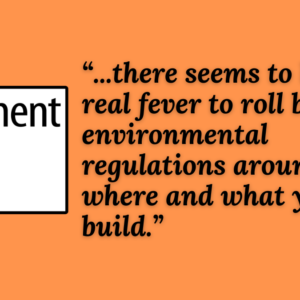
Our post about tomorrow’s public hearing on the Oregon Legislature’s 2025 transportation bill didn’t receive a lot of comments. Maybe budgets and numbers are off-putting to many readers.
But reader “mh” wrote a comment I liked, so I waded through the post, its link to one Jonathan’s previous posts, and ultimately to an article economist Joe Cortright posted on his City Observer site earlier this year.
And I’ll be damned if “mh” isn’t saying the same thing as Cortright did! (Only “mh’s” commented is shorter, sweeter, and simpler.)
Basically, “mh” wants to be charged “for the wear we actually put on the roads” (sort of like ODOT already does for large freight trucks). But, as Cortright concludes, ODOT isn’t counting costs, (“the wear” to the roads). No, it’s accounting for its expenditures — how ODOT allocates its money. And ODOT’s expenditure choices reflect the department’s bias toward freeway building rather than maintenance.
But let’s get back to short and sweet. Here’s what “mh” wrote:
(Weight x miles) for every vehicle. For passenger vehicles, weight is the manufacturer’s stated weight, for the first registration you pay based on the average number of miles the average vehicle is driven, on registration renewal you reconcile and the vehicle owner either pays more or is reimbursed. I guarantee I’d be reimbursed. I’ve been proposing this for years, and have yet to see anyone think it’s a good idea.
My little Honda Fit is charged a penalty for being a small, light car. The fact that it is driven very little is ignored – they just assume I owe more because they assume I drive it the 10k or whatever the average miles per year is. We don’t. Let us pay for the wear we actually put on the roads.
I’d happily pay (weight x miles) for my bike commutes if they provide me some way to track my miles, [and] if all the oversized SUVs also pay (weight x miles) for their roadway damage. That would make me a much more serene commuter.
Thank you for the clarity, “mh.” You can read “mh’s” comment in the context of the two other brave souls who wrote in.
And I hope to see you all on Tuesday, at the kick-off of the Joint Committee on Transportation’s statewide listening tour.







Thanks for reading.
BikePortland has served this community with independent community journalism since 2005. We rely on subscriptions from readers like you to survive. Your financial support is vital in keeping this valuable resource alive and well.
Please subscribe today to strengthen and expand our work.
Actually, if one factors out EV’s, which have to be addressed in another manner, the already in place gas tax is equitable. Heavy vehicles pay a proportionally higher tax because they consume more fuel. The posters Honda Fit pays less because it is way more fuel efficient. The gas tax also more equitably captures the increased wear on roads by those who drive more versus those who drive very little, such as many on this site who primarily get around via bike and only drive for select purposes. Should a person who drives only 3,000 miles per year be taxed at the same rate as someone who drives 20,000? If the existing gas tax is not raising sufficient funds to meet needs, then it needs to be raised rather than creating a new category of tax. Going back to EV’s, they would be penalized by a weight mile tax as they tend to be heavier than a comparable ICE size vehicle due to batteries.
I almost posted a similar comment on the original thread. I will add two points. 1) registration is a fee that does not depend on usage. 2) The gas tax is relatively simple to collect compared to a scheme in which the registration process becomes more complicated. More DMV? No thanks.
Given that we’re steadily heading in the direction of ubiquitous electric passenger vehicles, which will require a weight*mile tax or similar scheme as noted by TK, wouldn’t it make sense to simplify the system with a single tax for all passenger vehicles that works well into the future?
The “more DMV” option is also quite simple with the main downside being that some drivers could end up getting hit with a large bill at renewal, but this could be mitigated somewhat with yearly mileage certification, which could be done at any service shop reporting to DMV (as opposed to having to go to a DMV/DEQ station). The state already does something similar with the DEQ Too program for emissions testing, so there’s already a precedent for this kind of thing.
Additionally, I think there should be both a standard weight*mile tax PLUS an extra tax for gas/diesel vehicles, with the usual caveats for low income people and special circumstances. I say this as an owner of a gasoline-powered vehicle (which I have to mention avoid any anti-car accusations).
Taking this into account it seems to me that the best solution would be a weight x mile tax for all vehicles and a carbon tax for petroleum-based fuel.
The problem with this idea is that it does not account for where the miles were driven on the car. Oregon is not allowed for instance to tax miles that were driven in Washington. I firmly support a weight-mile tax, but implementing it requires something like a gps device that can determine if the vehicle is being driven within the state. I think Oregon started looking at this in the early to mid 2000’s with a task force that had a name like RUFTF or similar, people referred to it as rough tough.
Doesn’t a similar problem exist for the gas tax? I could fill my tank in Portland for a trip around Mount Saint Helens and not fill up till I get back home. Or what about people commuting into Oregon from Vancouver or vice versa?
It’s not _exactly_ the same, because for longer out of state trips, you’ll almost certainly fill up in another state, but there’s still the fundamental issue that there’s no easy, non-intrusive way to know where the miles were driven.
No — you are taxed on the gasoline you buy, not the driving you do with it. You might argue that this is a distinction without a difference, but I suspect it is quite important both legally and politically.
They could structure it so that it is a tax, fee, or surcharge for having a “high milage vehicle” registered and on the road in Oregon. Helpfully the fee increases on a sliding scale proportional to the milage. Not a fee for driving but a charge for registering a vehicle with a certain milage.
I’m sure this won’t satisfy your interpretation of the law, but I have confidence in the State’s ability to think of a way to structure this.
My interpretation doesn’t matter; it’s what the courts think. If Oregon taxes residents for driving they do in Washington, there will be a challenge.
The easy way to structure a VMT tax is to have every car use a tracking device, but that comes with some obvious problems. The device could report aggregate data without specific locations, but many would not trust it. You could ask people to attest to the miles they drove in-state vs out-of-state.
Alternatively, an odometer-based tax could be imposed at the federal level (assuming it’s constitutional) with the proceeds apportioned to the states using a statistical model.
There may be other options. None of them are good.
Tolls?
Sure; so long as it doesn’t divert traffic onto the streets I bike on.
an easy to implement solution would be to go to length/weight based parking charges, the parking kitty app could be updated to include this data and the increased revenue should easily cover the development costs.
Streets will deteriorate if anyone is on them or not. A road not used at all will still deteriorate.
Precisely why we should find ways to de-pave to lower maintenance costs.
However, road deterioration rate increases with vehicle weight. Electric vehicles are heavier and not paying a gas tax. Studded tire users are also not taxed enough for the damage they cause.
Unpaved roads generally deteriorate even faster, sometimes it’s the reason why roads even get paved.
Some of the places I go you see the paved part end and the roads get so much worse without regular upkeep, so bad some of the places I can’t continue in my normal car and have to use a dirtbike.
I strongly support your vision of our road system.
Yes but usage, especially by heavier vehicles, increases the deterioration rate. Meaning more frequent repair and maintenance.
Seems like a fine idea in theory but one that’s so impractical it’s not much use in reality. As others have pointed out the gas tax get close to this already except for EVs and considering we want to encourage them for cleaner air reasons maybe it’s ok if they are exempt for now.
Perhaps as EVs become more ubiquitous we could tax something else with an association like tires, or maybe a scheme like this could be more viable with just EVs since they are newer and it’s harder to roll back miles on them unlike older cars.
In some sense though an EV that doesn’t get driven much isn’t that great either from a total environmental impact perspective so maybe when EVs become ubiquitous enough we could set the registration just based on weight.
There are plenty of ultra-cheap used EVs and used EV batteries available. Some of them even cost $1:
https://portland.craigslist.org/search/sss?userpostingid=7429120424#search=1~gallery~0~0
At some point we need to decouple paying for roads from this notion of “I only did X amount of damage to the road, so I should pay less”.
I bike ~4k miles a year right now. 30% of it on off road paths. My gross curb weight is about 230lbs. I ride the MAX also and have traveled under 1k miles as a passenger (likely under 500 TBH).
If I only pay for the miles I travel on public roadways at that rate I’m not paying my share.
I benefit from the roads even if I’m not using them – deliveries to my local store, emergency responders ability to get to me are just 2 ways.
A progressive tax base dedicated to maintaining our roads would mean we all pay not only for our individual use, but for the benefit to our whole community in a fair way.
We’d also probably need to make it a Federal tax since people travel roads in local jurisdictions they don’t pay taxes in. The analysis of how to distribute it would be a bear – but I’ve seen my brother do some pretty impressive predictive analysis with statistical models – he does have the record for the most accurate revenue prediction OEA has ever generated after all 🙂
When I can license and insure my bicycle as easily (and more affordably) as one insures a car, and when I can have some meaningful assurance that mishaps on or about my bicycle will be taken as seriously under the law, then I might be fine with having a GPS added to my bike at the state’s expense.
Until then, I’ll remain untrackable and count my blessings.
I’m late to this conversation, but I’d like to add this little factoid: back when my dad ran a logging operation, he bought all his fuel free of P. U. C. taxes. He used that fuel in both on-and-off highway vehicles. He kept meticulous record of on-highway use and paid the road taxes quarterly. Back then it was a manual process, but modern GPS tech could completely automate the recording of miles on and off they highway system. I don’t see why we couldn’t implement something like that for everyone in this modern age. Different taxing agencies could get their due based on GPS evidence and road use taxes could be apportioned to vehicle type. No miss, no fuss, except for the SUV crowd…
On a technical level, we absolutely could. On a political level, it’s more difficult because many people would be uneasy about a government tracker in their car. (Yes, I know many of those same people also carry cell phones, but the optics (and realities) of those scenarios are much different.)